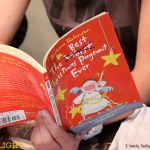When I read Paul's shocking words "I have learned to be content whatever the circumstances" (Philippians 4:11), I sometimes wonder … how? What is the secret?
Life makes it easy to be discontent. We don't have to work hard to complain. Just look at what encourages us to grumble—from pervasive advertising that tells us what we lack, to housework that never ends, to our physical appearance (which always seems less than perfect). Even homeschooling can make us feel like we are never doing enough, are never good enough, or have a less-than-ideal family life.
But grumbling is such a lousy way to live! What can we do to combat this and learn, like Paul, how to be content? I appreciate what Charles Spurgeon wrote in a short devotional many years ago. (I read a daily devotional from him, and my daughter Jonelle receives these devotionals twice a day via email; you can sign up for that free service here.)
Spurgeon suggests that we must purposely cultivate contentment. I would add that practicing gratitude is one very practical way to do that. May Spurgeon's words encourage you as they did me:
"I have learned, in whatever state I am, therewith to be content." Philippians 4:11
These words show us that contentment is not a natural propensity of man. "Ill weeds grow apace." Covetousness, discontent, and murmuring are as natural to man as thorns are to the soil. We need not sow thistles and brambles; they come up naturally enough, because they are indigenous to earth: and so, we need not teach men to complain; they complain fast enough without any education. But the precious things of the earth must be cultivated. If we would have wheat, we must plough and sow; if we want flowers, there must be the garden, and all the gardener's care.
Now, contentment is one of the flowers of heaven, and if we would have it, it must be cultivated; it will not grow in us by nature; it is the new nature alone that can produce it, and even then we must be specially careful and watchful that we maintain and cultivate the grace which God has sown in us. Paul says, "I have learned ... to be content;" as much as to say, he did not know how at one time. It cost him some pains to attain to the mystery of that great truth. No doubt he sometimes thought he had learned, and then broke down. And when at last he had attained unto it, and could say, "I have learned in whatsoever state I am, therewith to be content," he was an old, grey-headed man, upon the borders of the grave-a poor prisoner shut up in Nero's dungeon at Rome.
We might well be willing to endure Paul's infirmities, and share the cold dungeon with him, if we too might by any means attain unto his good degree. Do not indulge the notion that you can be contented with learning, or learn without discipline. It is not a power that may be exercised naturally, but a science to be acquired gradually. We know this from experience. Brother, hush that murmur, natural though it be, and continue a diligent pupil in the College of Content.
I pray that I become more content each passing year. Will you join me on that journey?
Sincerely,
Sarita






